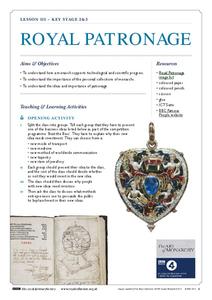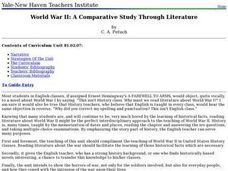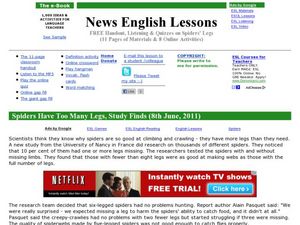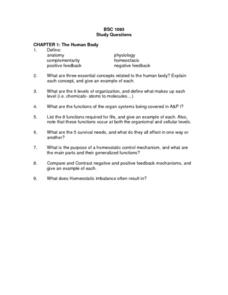Classroom Law Project
Should we believe everything we read? Becoming a discerning consumer of media
Class members investigate the role media should play in a healthy democracy. As part of this study, groups analyze political advertising, use FactCheck to assess not only the veracity of but the persuasions techniques used in candidates'...
Classroom Law Project
What does the Constitution say about voting? Constitutional Amendments and the Electoral College
As part of a study of voting rights in the US, class members examine Constitutional amendments connected with voting and the role of the Electoral College in the election process.
BBC
Royal Patronage
The relationship between European royalty and the artists, scientists, and philosophers they support has been a building block in the artistic and technological progress throughout the world. Learn more about patronage throughout the...
Library of Virginia
An Overview of American Slavery
The final lesson in a unit study of American slavery asks young historians to synthesize what they have learned about how slavery in America changed over time. Revisiting the many documents they have examined, they consider the economic,...
Constitutional Rights Foundation
The Declaration of Independence
Your class can write a PSA about the Declaration of Independence! They write public service announcements and present them to the class. They also engage in reading and discussion activities to further understand a challenging—yet...
PBS
Explicit and Implicit Language – Interpreting the Meaning of the Fourteenth Amendment
How do Supreme Court justices interpret amendments to the Constitution? The resource helps answer that question by discussing how people use explicit and implicit language to interpret the meaning of the Fourteenth Amendment. Learners...
Curated OER
Scientists Study Dinosaur "Mummy"
Young scholars share ideas about how scientists know about dinosaurs, then read a news article about the recently found remains of a hadrosaur. In this dinosaur lesson plan, the teacher introduces the article with a class discussion and...
Curated OER
A Separate Peace: Chapter 13 Reading And Study Guide
For this comprehension check worksheet, students define 3 vocabulary words, define 1 literary term, and respond to 6 short answer questions pertaining to chapter 13 of A Separate Peace by John Knowlesin order to help them better...
Curated OER
A Separate Peace: Chapter 12 Reading And Study Guide
In this comprehension check worksheet, students define 4 vocabulary words, define 1 literary term, and respond to 8 short answer questions pertaining to chapter 12 of A Separate Peace by John Knowles in order to help them better...
Curated OER
World War II: A Compartive Study through Literature
Students examine World War II through the use of literature. As a class, they brainstorm a list of words they relate to the war itself. In groups, they read various novels and view photographs showing the experiences of the Jews,...
Anti-Defamation League
Identity-Based Bullying
What is identity? What is bullying? What is identity-based bullying? After discussing these questions as a class, pupils engage in partner discussions before participating in a small group activity to act out bullying scenarios. Then,...
Memorial Hall Museum
Problems and Events Leading Up To the Attack of 1704
Groups read primary and secondary sources detailing the ambush at Bloody Brook on September 18, 1675 and the attack on The Falls in May of 1676. After examining the results of each attack, groups reflect on the language used in the...
Global Oneness Project
Exploring Cultural Sustainability
Small groups learn about a present-day nomadic culture in Mongolia and the threats to its existence by exploring a photo essay. The resource includes thoughtful discussion and writing prompts about cultural sustainability, the...
Heritage Foundation
Slavery and the Constitution
It's hard to believe the abolition movement was once seen as scandalous. Help learners understand how the US Constitution changed everything. A variety of activities such as corresponding reading activities, group work ideas, and...
Curated OER
Study Habits
Students investigate their own good and poor study habits. They write a plan to improve their weaknesses.
Curated OER
Past and Present New York Through A Comparative Study of Photography and Poetry
Pupils study New York in three time periods, 1890-1930, 1930's, and 1950's-60's. They discuss themes that are important in each time block. They describe a brief historical picture of each time period before they approach works of...
Curated OER
Invertebrate Study
Young scholars study invertebrates, more specifically flatworms, in this technology-based lesson which features www.nettrekker.com and word processing skills. The lesson concludes with each student create an individual word file of...
Curated OER
Help! I Need Five Minutes to Study
Students learn to use a time grid or a calendar to increase productivity of their studying. In this studying lesson, students record how they spend their studying time and then adjust as needed. Students recognize various ways to...
Curated OER
Map Studies
Students study maps and use web based activities to develop their mapping skills. For this mapping skills lesson, students use the internet to define cartography they make a list of information regarding a typical road map and explain...
Curated OER
Spiders Have Too Many Legs, Study Finds
Students explore current events by answering study questions about an article. In this arachnids instructional activity, students read a recently published article which discusses the importance of spiders and their 8 legs. Students...
Curated OER
Cardiovascular System Definitions and Study Questions
In this cardiovascular system study question worksheet, students define 21 words associated with this system. They answer 16 short answer questions related to circulation of blood through the body.
Curated OER
The Human Body Study Questions
In this human body study question worksheet, students define 6 words associated with the human body. They answer 8 short answer questions about the organization and function of the organ systems and organization structure of the human body.
Curated OER
Fluids, Electrolytes, and Acid-Base Balance Study Questions
In this fluids, electrolytes, and acid-bas balance system study questions, young scholars define 12 words associated with this system. They answer 12 short answer questions about the components of the acid-balance system.
Curated OER
Forces and Energy Study Guide
Sixth graders use prior knowledge to create a tri-fold study guide using Microsoft Publisher (if available). They include real world examples that show balanced and unbalanced forces, kinetic and potential energy, and vocabulary. The...
Other popular searches
- Word Study Activities
- Word Study and Fluency
- Word Study Games
- Word Study Lesson Plans
- Word Study Lessons
- Solar System Word Study
- Esl Word Study
- Word Study Second Grade
- Vocabulary Word Study
- Phonics/word Study
- Old Word Study
- Word Study Ough

























